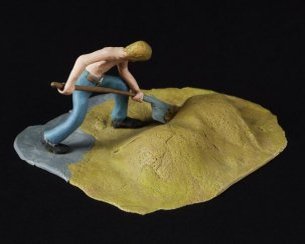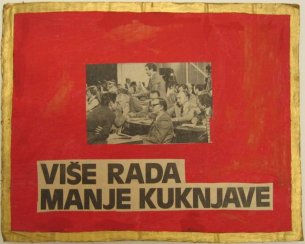| |
|
|
Arbeit* |
|||||||
|
|
|||||||
|
|
||||||
| Robert Adrian X (CDN/A), Conrad Atkinson (UK), Berwick Street Film Collective (UK), Ursula Biemann (CH), Michael Blum (F/IL), Olga Chernysheva (RUS), Carole Condé und Karl Beveridge (CDN), Harun Farocki (D), Martin Gostner (A), Paul Graham (UK), Grup de Treball (E), Margaret Harrison (UK), Lulu Shur-Tzy Hou (Taiwan), Alexis Hunter (UK), -Innen plus (Korinna Knoll, Ellen Nonnenmacher, Susanne Ackers, Janine Sack and Cornelia Sollfrank) (D), Kirsten Justesen (DK), Tina Keane (UK), Mary Kelly (USA), Margareta Klingberg (S), Richard Kriesche (A), k.u.u.g.e.l. (A), Mierle Laderman Ukeles (USA), Pia Lanzinger (D), Pauline Boudry / Marion von Osten (D), Adrian Paci (AL), Christine S. Prantauer (A), Martha Rosler (USA), Monica Ross mit Shirley Cameron und Evelyn Silver (UK),Ruth Schnell (A), Mladen Stilinović (HR), Anne Tallentire (UK), Jeff Wall (CDN), Carey Young (UK), Moira Zoitl (A) | |||||||
| Opening Friday, 3 June 2005, 7 pm Opening by Dr. Elisabeth Zanon, head of the Tyrolean’s government office for cultural affairs Dr. Katy Deepwell, editor of n.paradoxa will speak about the exhibition |
|||||||
|
The theme of this exhibition project is work / labor, which, over the past four decades, has become a central focus of the visual arts. Important is that art does not limit itself to depicting working individuals but also explores the structural conditions of work. Proceeding from artistic positions from the 1960s and 1970s, and extending to very recent works, the exhibition deals with issues such as women’s work, globalization and globalized gender relations or forms of transition from socialist to capitalist work. Most of the historical positions formulate a reflection of the political movements of the 1960s and 1970s from the perspectives of a left and feminist critique of ideology and society. “Work / labor” as a social activity (André Gorz) is revealed to be a social construct and critically interpreted as such. Here activist forms of art dealing with real work situations play a central role. The artist reacts to the changing working conditions taking place in this period, which “on the one hand, have led to a growing destabilization of employment as a result of working conditions becoming increasingly informal and precarious” and also “lead to a growing polarization of employment possibilities.” (Saskia Sassen) In the USA , for instance, Martha Rosler studies the dress rules for waitresses and Mierle Laderman Ukeles cleans the steps of the main entrance to a museum in Hartford , Connecticut , while Mary Kelly documents for a period of time her work and care for her new-born infant. Conrad Atkinson addresses the theme of “garbage strikes”; the Berwick Film Collective devotes its film to women cleaning London office s during nights. Margaret Harrison fights for the interests of British homeworkers. Carole Condé and Karl Beveridge restage the working world of the General Motors factory in Oshawa, Canada, using interviews that they conducted with workers organized in labor unions. Richard Kriesche reconstructs a project that he carried out with convicts in 1980. Globalization and the concomitant phenomenon of migration have contributed in this development to blurring the social notion of work. Gainful employment has been devalued in the western industrial nations as a result of the outsourcing of entire industrial sectors in “low-wage countries. It has been replaced by often precarious working conditions in the service sector with often much lower pay. Moreover, this development has led to new forms of work such as tele-work/homework, part-time work, etc. on the one hand and to “network societies ” on the other, playing a crucial role in this change of the understanding of work. “The flexible individual is often unable to draw a clear line between everyday life and work life . (Richard Sennett) Part-time work, tele/home work, sex work, women’s work, “foreign workers” as well as unemployment and strikes are thus also themes that have increasingly become the focus of artistic work since the 1980s. A selection: Paul Graham photographs labor office s in England which under the Thatcher administration were overrun. Ursula Biemann follows the worldwide migration of women to the sex industry. Michael Blum makes an effort to visit one of the Indonesian factories where his world logo sneakers are being produced. Olga Chernysheva offers an image of the hierarchy in a Russian chocolate factory. Mladen Stilinović comments in a melancholy and ironic way on the postcommunist situation in Croatia. Christine S. Prantauer documents on a billboard − with daily updating − the worldwide, daily resistance against grievances and changes for the worse in the working world. Margareta Klingberg photographs migrants from Thailand while working both either in their home country or in Sweden . Harun Farocki traces the motif of “workers leaving the factory” which has been documented in film since the Lumière brothers. Pia Lanzinger is furnishing a tele-home work place and Moira Zoitl offers a typical representation of thousands of Philippine maids in Hongkong. As the site of one of her pieces Carey Young selected the MPreis supermarket chain stores in Tyrol. Curators |
|||||||
|
Catalogue
Ed. Silvia Eiblmayr, Galerie im Taxispalais Symposium with Conrad Atkinson, Ursula Biemann, Ljubomir Bratić, Carole Condé und Karl Beveridge, Katy Deepwell, Harun Farocki, Margaret Harrison, Kirsten Justesen, Richard Kriesche, k.u.u.g.e.l., Marion von Osten, Erika Thurner |
|||||||
|
Tour with
the curators Catalogue
presentation "Nightcleaners"
from Berwick Street Film Collective (1975), performing hours |
|||||||
| With the friendly support of | |||||||
|
|||||||
|
|||||||
|



